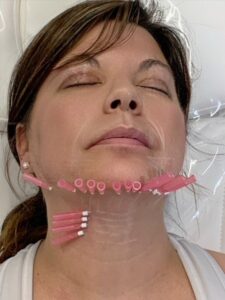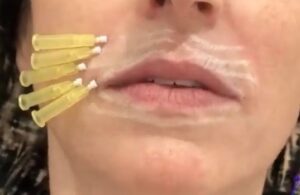PDO Threads: The Future of Non-Surgical Facelifts
While many clinics have hopped on the anti-aging bandwagon, few tread the fine line between natural treatments, art, and innovation as gracefully as Benehealth. In pursuit of youthful radiance, many of us are hesitant to undergo invasive surgical procedures. And understandably so considering the risks and costs associated with cosmetic surgery. At Benehealth, we encourage the most natural treatments available to promote a non-surgical facelift, before going under the knife. This includes the use of PDO Threads.
The introduction of PDO threads has sparked a revolution, offering a natural, non-surgical method to achieve the youthful appearance we desire. But what exactly are these threads, and how can you expect them to transform your appearance? With Benehealth, you’re not just embracing youthfulness, you’re doing it holistically and knowledgeably. Let’s explore this innovative treatment.
What Are PDO Threads?
PDO threads are made of polydioxanone, a biodegradable and biocompatible material. These threads not only lift and tighten the skin but also stimulate the body’s natural healing and collagen production. Here lies the essence of its appeal — a treatment that works in harmony with your body’s own mechanisms. PDO threads promote collogen production. PDO, which has been used for surgical sutures for many years, is now paving its way in cosmetic treatments.
Boosting Collagen Naturally with PDO Threads
Unlike invasive procedures, PDO threads tap into the body’s innate ability to heal and regenerate. Here’s how:
- Stimulating Collagen Production: By inserting the threads (feels like a small pinprick), the body’s natural response is to heal around them, producing collagen, a protein vital for skin elasticity and firmness.
- Natural Absorption: The threads dissolve naturally over time, leaving behind a framework that continues to support and rejuvenate the skin.
- No Foreign Substances: As the threads are made of a biocompatible material, they work with your body rather than against it, reducing the risk of adverse reactions.
How Are They Used?
The procedure involves inserting fine PDO threads into the subcutaneous layer of the skin using a cannula or fine needle. These threads create a supportive mesh under the skin, which acts like scaffolding. Over time, the threads dissolve, leaving behind a structure that helps to keep the skin uplifted and prevent further sagging.
- Consultation: The process begins with a comprehensive consultation to understand your needs and expectations.
- Preparation: The targeted area is thoroughly cleaned. Most smooth threads do not require local anesthetic, but occasionally your practitioner may decide to numb based on the type of thread being inserted.
- Insertion: After drawing lines to the area for insertion and taking photos, the threads are skillfully inserted into the skin in a pre-determined pattern based on your specific goals and needs.
- Completion: The threads dissolve over 4-6 months, during which collagen production is stimulated. Results may last up to 18-months, however, with smooth threads a “touch-up” is best every 6 months using a smaller number of threads.
 What Effects of PDO Threads Can Be Expected?
What Effects of PDO Threads Can Be Expected?
- Immediate Lifting: If using barbed threads, often a noticeable lift can be seen immediately post-procedure. Smooth threads will start to see results gradually over 1-3 months.
- Long-term Tightening: As the body naturally absorbs the threads, collagen production is stimulated, leading to more sustained results.
- Improved Skin Texture: By boosting collagen, skin texture and elasticity are improved, reducing wrinkles and fine lines.
Pre-Treatment Expectations
- Medical History: Patients must discuss their full medical history with their practitioner. Before diving into the PDO thread treatment, it’s essential to have an open conversation with your practitioner about your entire health journey. Remember, every aspect of your well-being, from your daily habits to your nutrition, can influence the treatment’s effectiveness and longevity. Let’s ensure you get the best possible results!
- Medications to Avoid Before Your PDO Thread Procedure: Before undergoing a PDO thread procedure, certain medications and supplements that can increase bleeding or affect the healing process should typically be avoided, but only if recommended by your practitioner.
Here’s a list of common medications and supplements that patients might be advised to discontinue before the procedure:
- Antiplatelet Agents:
– Aspirin
– Clopidogrel (Plavix)
– Dipyridamole (Persantine)
- Anticoagulants (Blood Thinners):
– Warfarin (Coumadin)
– Heparin
– Enoxaparin (Lovenox)
– Rivaroxaban (Xarelto)
– Dabigatran (Pradaxa)
– Apixaban (Eliquis)
- Non-Steroidal Anti-Inflammatory Drugs (NSAIDs):
– Ibuprofen (Advil, Motrin)
– Naproxen (Aleve, Naprosyn)
– Celecoxib (Celebrex)
– Indomethacin (Indocin)
- Some Herbal Supplements and Vitamins:
– Vitamin E
– Omega-3 fatty acids (Fish oil)
– Ginkgo Biloba
– Garlic supplements
– Ginseng
– St. John’s Wort
– Turmeric/Curcumin supplements
- Certain Over-The-Counter Medications and Supplements:
– Excessive alcohol consumption
– Any other medication known to increase bleeding risk
- Other Medications:
– Certain antidepressants, such as selective serotonin reuptake inhibitors (SSRIs)
– Medications that affect immune function
Please note:**Always consult with your healthcare provider or practitioner before discontinuing any medications or supplements. This list is not exhaustive, and individual needs or contraindications may vary based on the specifics of the PDO thread procedure and a patient’s health profile.
- Skin Care: A gentle skin care regimen might be prescribed before and after the treatment.
 Post-Treatment Expectations
Post-Treatment Expectations
- Minor Discomfort: Some swelling, bruising, or discomfort is normal but should resolve within 7-10 days.
- Skin Care Routine: Following a proper skincare routine as advised by the practitioner is essential.
- Avoid Strenuous Activities: It is usually recommended to avoid heavy exercise for 7-10 days post-treatment.
- Regular Check-ups: Follow-up appointments may be needed to assess the results and monitor progress.
- Post-PDO Care: Supplements to Boost Healing and Enhance Results Optimizing collagen stimulation and ensuring a healthy recovery post-PDO thread procedure can be supported by certain supplements. These nutrients can help boost the body’s natural collagen production, reduce inflammation, and support overall skin health. Your practitioner will recommend which ones are best for post-care specifically for you:
- Vitamin C: An essential vitamin for collagen synthesis. It acts as a cofactor for the enzymes responsible for stabilizing and cross-linking the collagen molecules.
- Collagen Peptides: Hydrolyzed collagen supplements can provide the amino acids necessary for the body to produce its own collagen.
- Hyaluronic Acid: While it doesn’t directly stimulate collagen, it can help moisturize the skin from within, giving it a plump appearance and supporting the effects of the PDO threads.
- Vitamin E: A powerful antioxidant, vitamin E helps combat oxidative stress which can degrade collagen fibers.
- Zinc: An essential mineral that acts as a cofactor for collagen synthesis and helps activate molecules necessary for the synthesis process.
- Silica: Found in horsetail extract and bamboo, silica helps strengthen collagen by providing the essential nutrients required for its formation.
- Biotin: Often linked to hair and nail health, biotin also plays a role in maintaining the health of our skin.
- Copper: This trace mineral is important for linking collagen and elastin together in the skin.
- Amino Acids: Glycine, proline, lysine, and hydroxyproline are key components of collagen molecules. Supplementing with these can provide the building blocks for collagen synthesis.
- Omega-3 Fatty Acids: These can help reduce inflammation post-procedure and support overall skin health.
- Antioxidants: Polyphenols found in green tea, resveratrol from red grapes, and anthocyanins from berries can protect the skin from oxidative stress, promoting healthy collagen and skin.
Please note:**Always consult with your healthcare provider or practitioner before starting any supplements, especially in the context of a medical procedure like PDO threads. The effectiveness and safety of supplements can vary, and individual needs may differ. Combining a balanced diet with these supplements will further enhance your body’s ability to heal and produce collagen.
Are PDO Threads Right for Everyone?
While PDO threads are considered safe and effective, not everyone is a candidate for this treatment.
PDO threads have been revolutionizing the aesthetic world, promising a rejuvenated look without the need for invasive surgery. While their safety and effectiveness are indeed impressive, the real magic lies in choosing the right practitioner who understands the intricacies of the procedure and tailors it to individual needs. Enter the practitioners at Benehealth.
Why Choose a Benehealth Practitioner for PDO Threads?
- Assessment Competency: Benehealth practitioners take the time to understand your unique skin journey. They go beyond surface-level consultations, diving deep into your medical history, lifestyle, and aesthetic goals following a functional medicine approach to holistic skin health.
- Unmatched Treatment Expertise: Experience and knowledge make a difference. With their comprehensive training and hands-on experience in PDO threads, Benehealth practitioners ensure that the procedure is seamless, comfortable, and tailored to your needs.
- Deep Knowledge: PDO threads, while transformative, aren’t suitable for everyone. The practitioners at Benehealth excel in discerning who can benefit most from the treatment. Their profound understanding of skin types, medical histories, and individual requirements ensures that you’re not just getting a procedure, but an experience optimized for the best results.
While PDO threads are considered safe and effective, the suitability of the treatment varies from person to person. It’s not just about the procedure but the expertise behind it. Consulting with a skilled and experienced practitioner, like those at Benehealth, is pivotal. They will guide you, ensuring the procedure aligns with your individual needs, medical history, and skin type.
Conclusion
In a world filled with artificial solutions, PDO threads offer a refreshing, natural alternative. By working with your body’s innate healing abilities, PDO threads provide a graceful, harmonious path to youthful radiance. Your skin deserves the best. So, why settle for less? Trust in the expertise of Benehealth practitioners and embark on a journey to radiant, uplifted skin. Book your consultation today, and let the transformation begin.

